2023 June GLOBAL Newsletter
June 29th, 2023 by admin
AcceptAbility Gala Highlights, New GLOBAL Fitness Program, Research and Medical Care Roundtables, and more – Your June Newsletter!
Several Down Syndrome Features May Be Linked to a Hyperactive Antiviral Immune Response – New Crnic Institute Research
June 20th, 2023 by Cole Wilkes
Estate Planning for Families Who Have a Loved One with Down Syndrome
June 16th, 2023 by admin
Hal Wright is the author of the must-read book ‘The Complete Guide to Creating A Special Needs Life Plan.’ After 27 years in finance, Hal became a beloved Certified Financial Planner specializing in planning for those with special needs. He is now retired but active on the speaking circuit.
From Down Syndrome World Issue 1, 2023
This is for families who have a loved one with Down syndrome— a child, a brother, a sister, a grandchild or perhaps a friend. I will primarily address the social aspects of estate planning without going into the legal or financial aspects, except that I will briefly address the role of a special needs trust in an estate plan. I also want to emphasize the importance of end-of-life care planning for a person with Down syndrome.
I have a daughter with Down syndrome in her mid-thirties. She has lived in her own apartment for ten years, independently with supports. A “child” in this article doesn’t mean someone under age 18. My daughter will be my child no matter how old she is.
ESTATE PLANNING 101
Estate planning is for anyone who has something valuable to leave to a loved one. By something valuable I mean real estate such as a house, financial assets such as retirement savings, death benefits from a life insurance policy, collectibles such as art, and so forth. Basically, anything that can be titled, valued, sold, or cashed in should be considered a potential element of an estate. Obviously wealthier families who own valuable property, a business or who
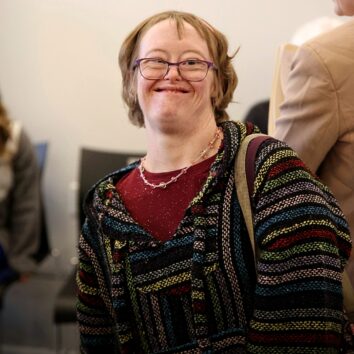
have substantial wealth will have complicated estate plans. However, even a family that has nothing to leave but love should consider how that love will be expressed and passed on. For them, a life plan for their child is a truly valuable legacy.
All parents should have a life plan for a child with special needs that describes the parents’ wishes for the child and the child’s wishes for themselves. The plan includes what is necessary to make it possible, that is, the resources and supports. All financial and legal plans, including estate plans, start with a life plan. A family’s financial plan and the parents’ retirement and estate plans must consider the cost of the child’s lifetime support and how to provide for it. There are five things you do to create a sustainable plan:
1. Develop a life plan and update it periodically for changes in circumstances. Pay special attention to major life transitions like aging out of school or the death of a parent.
2. Establish a circle of support to manage the life plan through all the years of the child’s life. This is especially important should the child outlive her parents.
3. Teach the life skills for community participation and maximum independence.
4. Write a letter of intent (LOI) to document the life plan including the arrangements you have made for care and support after you pass away. The LOI guides the people in the circle of support.
5. Decide on the forms of protection and oversight that the child will require when you’re no longer able to care for him yourself. This could be a court-appointed guardian whom you choose, personal advocates, agents holding powers of attorney and fiduciaries for managing money.
ACCOUNT FOR UNEXPECTED CIRCUMSTANCES
Too often inadequate consideration is given to how a plan evolves as the child ages. There are two important considerations to plan for.
First, parents should consider the possibility that their child could outlive them, especially if one parent dies or both die prematurely. Adequate life insurance is almost always a “must have” to the extent affordable. People with Down syndrome have shorter life spans than the wider population. Currently their life expectancy is around sixty years of age . (A life expectancy means half of the people will die earlier and half will die later than that age.) However, women who are over thirty-five years old have a higher chance of having a baby with Down syndrome than those who are under thirty-five. Thus, it is quite possible that a baby will outlive middle-aged parents if the child remains healthy throughout life. My daughter will likely outlive me, perhaps by fifteen years. She may outlive my spouse, Eleanor, who could well live into her nineties. However, Eleanor will likely experience the diminishments of aging (perhaps dementia) at an earlier age at the same time our daughter is needing greater care.
The second consideration, and the most tragic, is Alzheimer’s disease, the symptoms of which begin to appear in many adults with Down syndrome in their mid-fifties. Over fifty percent of people with Down syndrome will show symptoms by age 55. Therefore, and I cannot stress this enough, planning for the end-of-life care for someone with Down syndrome due to early onset dementia is something you must do. If your child is an adult, you cannot count on a medical miracle that will lift this scourge from our loved ones. While organizations like the Crnic Institute for Down Syndrome and the Global Down Syndrome Foundation are making progress, biologists and medical researchers have searched unsuccessfully for a cure for AIDS for over 40 years. Same with cancer.
It is quite possible that an individual who shows symptoms at age 55 could live for another six or seven years. In that span he may progress from care in an assisted living facility to eventually moving into a cognitive custodial care or skilled nursing facility. The problem is how to pay for the cost. Quality care is very expensive. Most parents plan, or perhaps only hope, they will take care of their child in their old age. This can become seriously unrealistic as they age and experience physical or cognitive decline or a serious disease themselves.
WHAT IS THE COST OF LONG-TERM CARE?
How expensive is the cost of care in a facility? In Denver, Colorado, the average cost of a private room in an assisted living facility in 2023 will likely range from $70,000 to $75,000 per year. (Costs as well as the quality of care vary widely.) Cognitive custodial care for dementia is around $90,000 annually. A private room in a skilled nursing facility is in the range of $130,000 a year. This presents a serious challenge for most families planning for their child’s end-of-life care. How can people pay such huge expenses over a five to seven year period?
Medicare does not cover the cost of long term care in a facility. Medicare is the federal health insurance program for people who are 65 or older, who have amyotrophic lateral sclerosis or end stage kidney failure, or who have received Social Security Disability benefits for twenty-four consecutive months.
What then, are the options?
Wealthy families will pay for the highest quality care. About ten percent of the American population are affluent enough to do so.
About twenty-five percent of the aging population has long term care insurance (LTCI) to cover the cost. Not surprisingly, it is impossible to get LTCI for a child with a disability.
Medicaid is a joint federal and state program that provides health coverage to people with low income. Medicaid pays about two-thirds of long-term care costs in this country because people either haven’t planned for it, they never had the financial means to buy insurance (it’s expensive), or they haven’t been able to save enough to pay for the care themselves. Anyone who has ever had a loved one, such as a parent, in a Medicaid facility will not want their child to end their lives in one if they can help it because of the problems with quality of care and concerns about abuse and neglect.
The considerations just described are why parents who have a child with special needs should be very serious about estate planning. An essential element of their estate plan will include an adequately funded trust to ensure the child’s (the beneficiary’s) lifetime financial support. Wealthy families will usually create a disability trust. Less affluent families will create a special needs trust which allows parents to leave money for their child’s support without affecting eligibility for means-tested government assistance such as Supplemental Security Income (SSI), Medicaid, and the Home and Community Based Services programs for persons with disabilities (HCBS, also called Medicaid-waiver). The two most common ways for funding a trust are regular contributions to a trust during life and life insurance. Life insurance is the most common way trusts are funded. Many use both. I use both.
Pre-funding end-of-life care for a child with Down syndrome will be, or certainly should be, a significant consideration in funding a trust. The costs of care will likely be in the range of a few to several hundred thousand dollars depending on when and how you fund the trust. This is why adequate life insurance is a must for most families.
Special needs planning includes a wide range of sophisticated and complex issues. Parents can and should do life planning themselves with assistance in areas such as social services and education. Most families will need professional advice for legal and financial planning. It is straight forward to find attorneys to draft legal documents such as personal wills and trusts. These attorneys practice in the domains of Elder Law and Trusts and Estates Law. It is harder to find financial planners who are knowledgeable, experienced, and ethical. I strongly recommend Certified Financial Planners or CFPs. I encourage you to work with a financial planner before you go to a life insurance agent. You should know what you need, not what someone wants to sell you.
WHERE DO YOU GO FROM HERE?
I have hit a few major considerations in special needs planning, but this article only scratches the surface. When I give presentations to parents and families, I leave them with: “Where do you go from here?” So I leave you with this. I have written a book on the subject: The Complete Guide to Creating a Special Needs Life Plan. Published in 2013, it explains how to create a comprehensive plan integrating the life, resource, financial and legal plans into a practical plan of action. When it was published, the Library Journal, the journal for professional librarians, gave it a red star review (meaning recommended for library acquisition) with the verdict: “Essential.” It still sells on Amazon. It is 360 pages in length with four, twenty-five-page case studies to show readers what a realistic plan looks like.
Although ten years old, it remains relevant today. If I were to update for a second edition, I would add a chapter titled: “A Home of Her Own: Supported Independence.” I passionately believe that supported independence for most adults with Down syndrome is a realistic goal with adequate planning, resources (including financial), and a good life plan.
I’ll close with a thought for those who are financially well-off enough to leave a substantial legacy. Most people think first about those they love – their spouse, their children, their grandchildren or a loved one like a brother or sister. However, some may want to consider a legacy to a charity or institution that has made a meaningful contribution to your child with Down syndrome’s well-being.
My daughter is in a race against time, a race between the clock as she ages and the medical professionals searching for a way to block the amyloid-β protein path, the significant contributor to the development of Alzheimer’s Disease.
I put this forth for my daughter’s sake and perhaps yours. Please consider in your estate planning, if you have the means to do so, a contribution to fund the research to stop this vicious disease and lift this scourge from our children.
Celebrities & Congress Step Out for People with Down Syndrome in Washington DC
June 8th, 2023 by Cole Wilkes
Over 300 Inspired Attendees Raise Over $400,000, Celebrate GLOBAL Honorees, and Experience an Intimate Heartfelt Performance by GRAMMY Award-Nominated Multiplatinum Singer-Songwriter Gavin DeGraw
Washington, D.C., Jun 08, 2023 (GLOBE NEWSWIRE) — Last night the Global Down Syndrome Foundation (GLOBAL) held its annual AcceptAbility Gala, DC’s largest fundraiser for people with Down syndrome, at the Hyatt Regency Washington on Capitol Hill. Celebrities passionate about the cause included GRAMMY Award-Nominated Multiplatinum Singer-Songwriter Gavin DeGraw, three-time Super Bowl champion and FOX NFL Analyst Mark Schlereth, actor, author and public speaker Frank Stephens, author and public speaker David Egan, and power-couple Kyra Phillips, an award-winning correspondent for ABC News and anchor for ABC News LIVE, and John Roberts, co-anchor of ‘America Reports with John Roberts and Sandra Smith’ on Fox News.
Representatives Katherine Clark (D-MA) and Pete Stauber (R-MN) received GLOBAL’s highest honor, the Quincy Jones Exceptional Advocacy Award, for their strong advocacy in Congress on behalf of people with Down syndrome. GLOBAL awardee alumni, Representative Cathy McMorris Rodgers (R-WA), and Representative Robert Aderholt (R-AL) provided keynotes and introduced the night’s honorees.
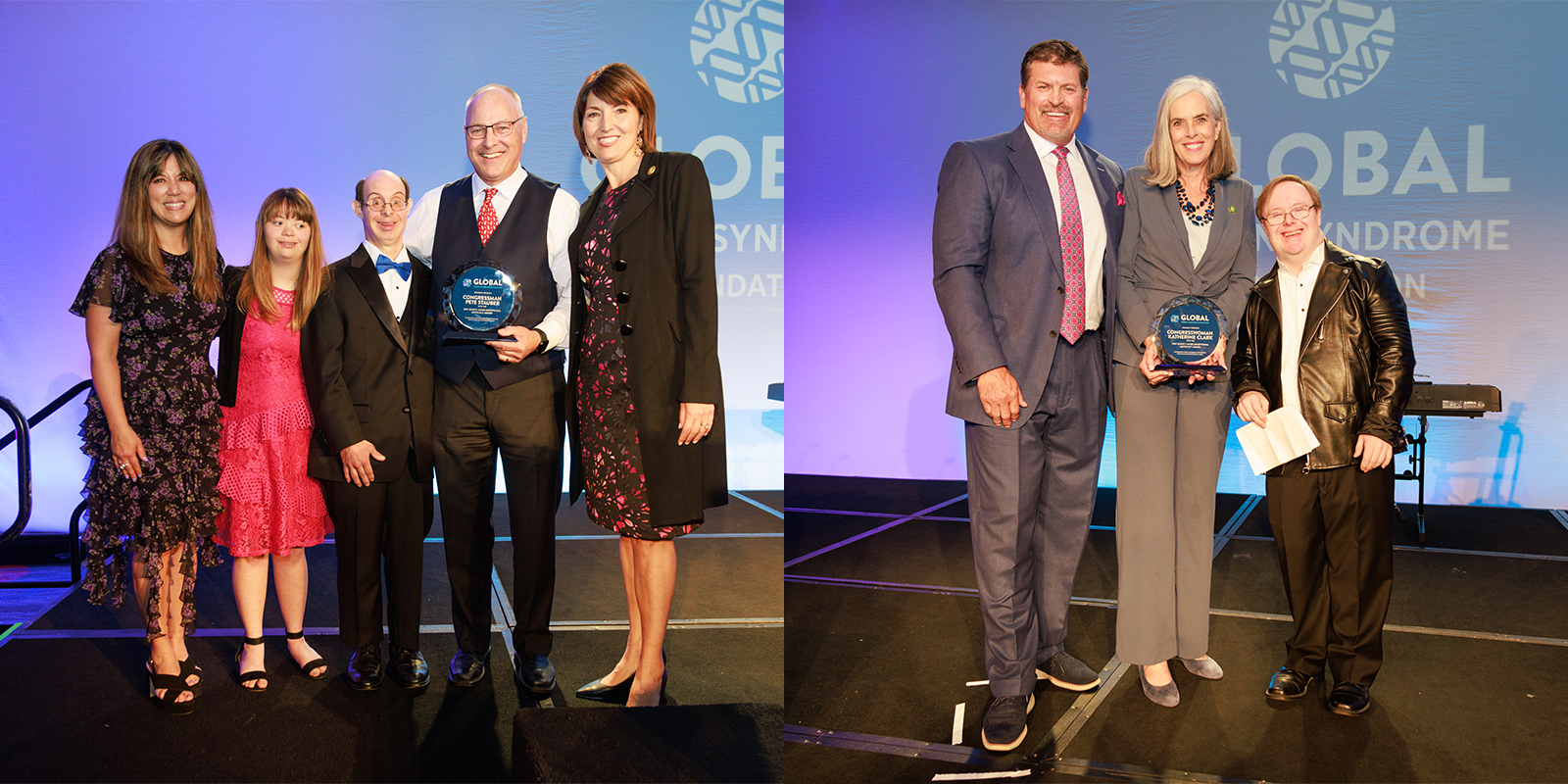
Congressman Pete Stauber (R-MN) and Congresswoman Katherine Clark (D-MA) Accepting their Quincy Jones Exceptional Advocacy Awards
Left to Right: Michelle Sie Whitten, Sophia Whitten, David Egan, Rep. Pete Stauber, Rep. Cathy McMorris Rodgers, Mark Schlereth, Rep. Katherine Clark & Frank Stephens
To recognize the transformative leadership of Representatives Rosa DeLauro (D-CT) and Tom Cole (R-OK), GLOBAL created a post-secondary scholarship in their names that was unveiled at the gala. Melissa Silverman received the inaugural Tom Cole GLOBAL Advancement Award and Eric Latcheran received the inaugural Rosa DeLauro GLOBAL Advancement Award.
With the help of GLOBAL Ambassador Abby Ashbrook and her family, and co-chairs Erin Mullen and Matt Perin, the inspirational gala attracted over 300 attendees and raised over $400,000 for GLOBAL’s life-saving research and medical care. GLOBAL supports over 200 researchers on the Anschutz Medical Campus at the Crnic Institute for Down Syndrome and the Alzheimer’s and Cognition Center, as well as over 2,200 patients from 33 states and 10 countries at the Sie Center for Down Syndrome. For nearly two decades Down syndrome was one of the least federally funded genetic conditions in the United States.
“I’m deeply moved to receive this honor from my friends at GLOBAL,” said Democratic Whip Katherine Clark. “From lifting up the voices of people with Down syndrome to fighting for new research investments, we share a straightforward mission: upholding the health and dignity of every person. I’m proud to be in this fight with them, and I look forward to building on the hard-won progress we’ve forged together.”
“My son Isaac is a blessing and I want everyone to know how people with Down syndrome make the world a better place,” says Representative Stauber. “Global Down Syndrome Foundation is leading the way for our children and adults so that they can live healthier and longer lives and I am honored to support their work and to receive this award. I will continue to fight for the rights of people who are differently-abled and I hope tonight inspired others to join us.”
“At GLOBAL we are working hard every day to elongate life and improve health outcomes for our loved ones with Down syndrome,” says GLOBAL Co-Founder, President, and CEO, Michelle Sie Whitten. “To have such overwhelming bi-partisan support – and a room full of people from NIH scientists to self-advocates with Down syndrome to corporate leaders – celebrating the impact of our work is extremely rewarding and appreciated. It is so clear that we are better together!”
At the end of the evening, Gavin DeGraw, delighted the audience with an intimate, heartfelt performance of some of his biggest hits including One Tree Hill theme song “I Don’t Want to Be,” while the inclusive dance troupe RhythmXpress and solo dancer Robert Wallop wowed attendees.
Additional notables in attendance included Congressman Pete Sessions (R-TX) and his son, GLOBAL Ambassador Alex Sessions; Senator John Hickenlooper (D-CO); Congresswoman Brittany Pettersen (D-CO), Down Syndrome Association of Jacksonville Executive Director, Debbie Revels; Down Syndrome Association of Delaware Executive Director, Lauren Gates; and Down Country Founder and President, Kate Dougherty.
To learn more about GLOBAL, visit www.globaldownsyndrome.org.
###
About Global Down Syndrome Foundation
The Global Down Syndrome Foundation (GLOBAL) is the largest non-profit in the U.S. working to save lives and dramatically improve health outcomes for people with Down syndrome. GLOBAL has donated more than $32 million to establish the first Down syndrome research institute supporting over 400 scientists and over 2,200 patients with Down syndrome from 33 states and 10 countries. Working closely with Congress and the National Institutes of Health, GLOBAL is the lead advocacy organization in the U.S. for Down syndrome research and care. GLOBAL has a membership of over 110 Down syndrome organizations worldwide, and is part of a network of Affiliates – the Crnic Institute for Down Syndrome, the Sie Center for Down Syndrome, and the University of Colorado Alzheimer’s and Cognition Center – all on the Anschutz Medical Campus.
GLOBAL’s widely circulated medical publications include Global Medical Care Guidelines for Adults with Down Syndrome, Prenatal Testing and Information about Down Syndrome, and the award-winning magazine Down Syndrome WorldTM. GLOBAL also organizes the Be Beautiful Be Yourself Fashion Show, the largest Down syndrome fundraiser in the world. Visit globaldownsyndrome.org and follow us on social media (Facebook & Twitter: @GDSFoundation, Instagram: @globaldownsyndrome).
Anca Elena Call
Global Down Syndrome Foundation
acall@globaldownsyndrome.org
720-320-3832
2023 AcceptAbility Gala Social Media Images
June 6th, 2023 by Global Down Syndrome Foundation
Right-click to “save image as” and download. Thank you!
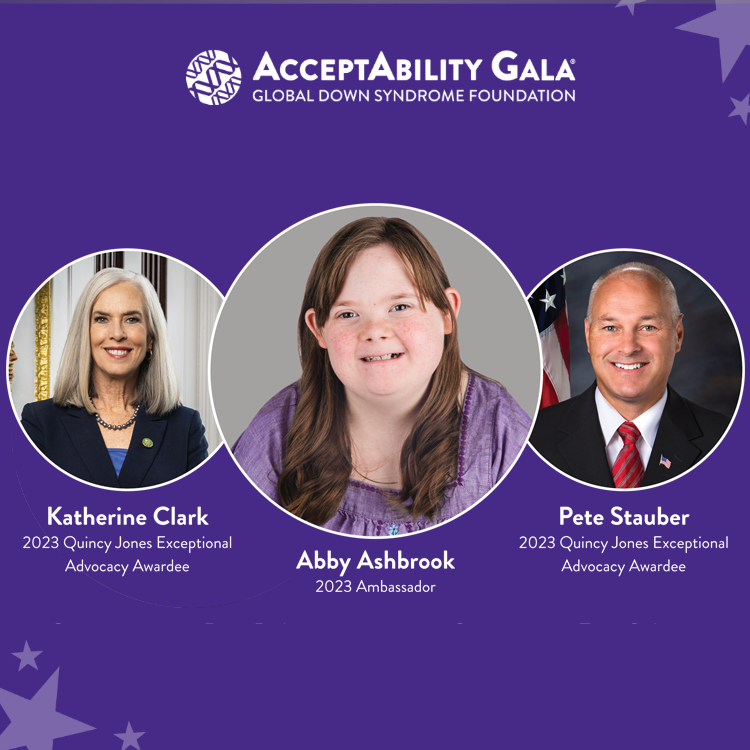
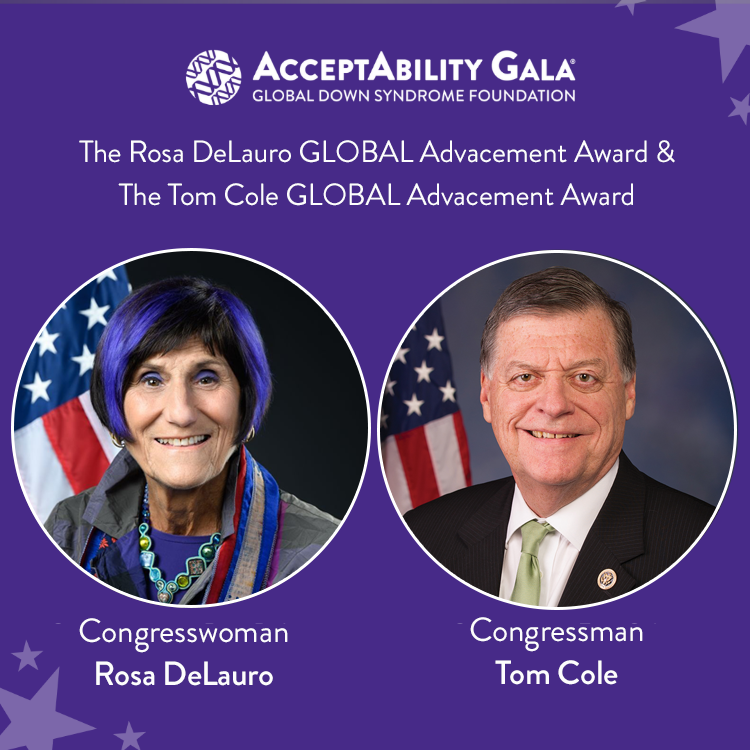
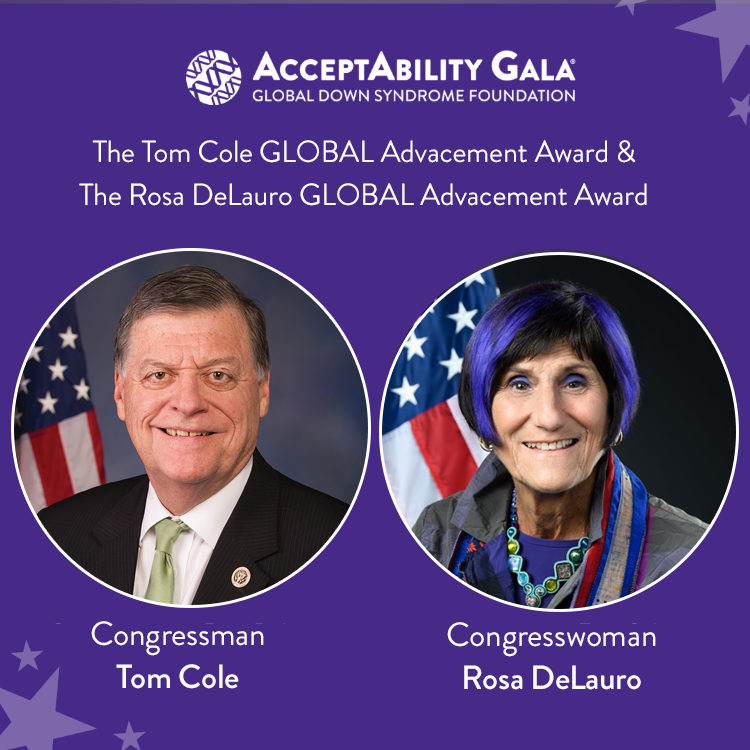
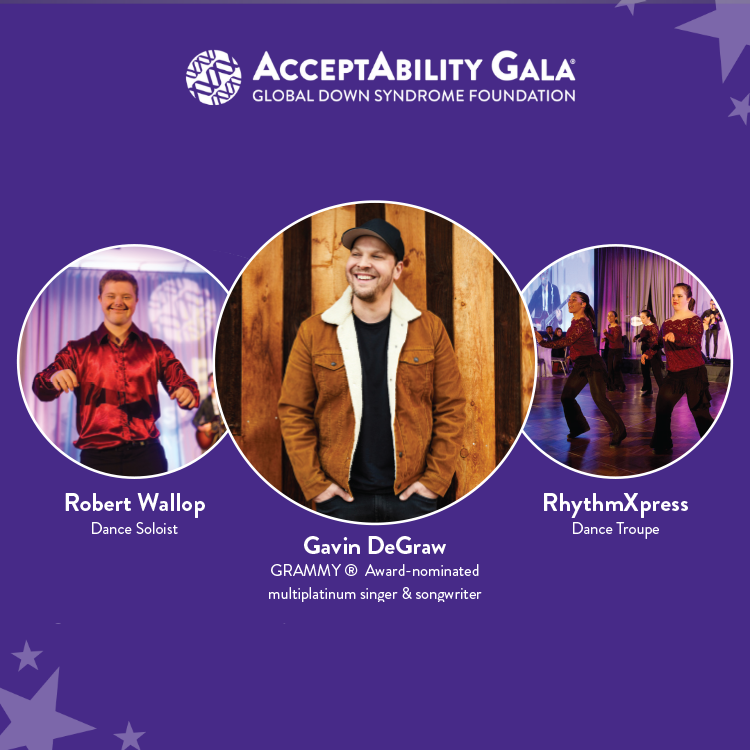

 Experience our inspirational and groundbreaking videos and photos. Our children and self-advocates are beautiful AND brilliant!
Experience our inspirational and groundbreaking videos and photos. Our children and self-advocates are beautiful AND brilliant! Make sure your local Representatives are on the Congressional Down Syndrome Task Force.
Make sure your local Representatives are on the Congressional Down Syndrome Task Force.